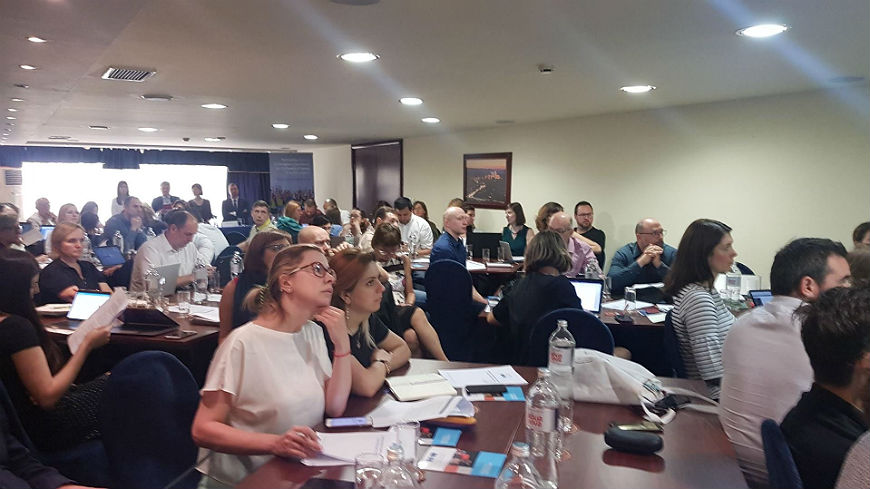Background
Providing support to knowledge-based youth policy and practice and to the development of a strong youth research infrastructure across the countries that are signatories of the European Cultural Convention are among the aims of the EU-Council of Europe youth partnership, especially within specific objective ‘Better Knowledge’ of its 2019 work plan.
On the occasion of the joint EKCYP and PEYR meeting of 2018, which also provided a forum for the development of youth research in Eastern Europe and Caucasus, participants highlighted the need to promote investment in research in their countries.
The engagement of the EU-Council of Europe youth partnership in South-East Europe is long-lasting, and concretised itself, in recent years, in a number of activities aiming at strengthening knowledge, policy and practice of and with youth in the region, particularly on the topics of youth participation, social inclusion, and youth work, to name but a few.
Youth research in South-East Europe has a long tradition, and it stems from, and is supported by, many EU programmes, private and public donors and foundations, active at transnational and national level. However, there are no regional unified perspectives, approaches or strategies, especially since youth policy, youth work and youth research proper are grounded on scattered basis, promoted by various actors, and there not exists a common youth research platform across the region. However, the reality of the cooperation between youth research and other actors, and notably youth workers and policy makers, varies from country to country and is yet to be fully mapped and comprehended.
Moreover, in 2019 the EU-Council of Europe youth partnership will publish a document ‘Youth research: the Essentials’: this document purports a more effective and open dialogue among researchers, policy makers, practitioners and young people, and for establishing opportunities and platforms for jointly advancing common and respective agendas in a knowledge-based perspective. This dialogue must take the form of a ‘Knowledge Translation’:
‘Over the last decades, there has been increasing international research attention on how to reduce the evidence-practice and policy gap. One of the most used, referenced and researched approaches to bridge this gap is Knowledge Translation (KT) or Knowledge Integration (KI), often described in more than 20 other terms. Independently of naming, KT is an umbrella of tools and activities to move research evidences into the hands of people and organisations that can put them into practical use to generate impact. Knowledge translation aims to get the right information, to the right people, at the right time, and in the most effective way to ensure that policies, programmes and practice are informed by the best available evidence. It is a solution to increase the relevance, applicability and impact of research in all fields’ (Maria-Paola de Salvo, Easytelling, https://www.easytelling.com.br/home-en accessed 21/02/2019)
By leveraging on the knowledge of the reality of youth work and youth policy in South-East Europe acquired across the years; on the competences of communication and research experts, of policy makers, practitioners, researchers from the region and beyond, and on its network of experts, the EU-Council of Europe youth partnership wishes to contribute to strengthening the dialogue among different actors involved in youth research in South-East Europe (SEE) through a one-day regional youth knowledge forum aiming at
- Taking stock of the reality of youth policy and youth work practice in SEE and reflect on how youth research, and the EU-Council of Europe youth partnership can have a supportive role for the actors involved in the region;
- Understating the reality of youth research in the region, and country by country, including actors, resources, strategies, and challenges;
- Fostering effective communication among main actors in the youth field in South-East Europe by looking at recent developments in communicating youth research, and notably at Knowledge Translation (KT), or Knowledge Integration (KI) techniques;
- Providing policy-makers, researchers and practitioners from the region with a unique opportunity for dialogue, refining common vocabulary and language, while networking knowledge, needs, and resources;
- Identifying possible projects and express recommendations for supporting research on and with youth in SEE;
- Taking forward the common projects of EKCYP and PEYR for 2019, and notably the study on social inclusion of young people and digitalisation, the expert reflection on youth policy evaluation, and the research on youth work professions, education and training, on the job support;
- Engagement of EKCYP and PEYR with the online Perspectives on youth.
Participants
Up to 70, from the following categories:
- Correspondents of the European Knowledge Centre on Youth Policy;
- Members of the Pool of European Youth Researchers;
- Policy makers from South-East Europe responsible for youth matters, at local and national level;
- Representatives of bodies and organisations responsible for youth work, youth policy at national and regional level;
- Youth research providers from the region, including Universities and research centres.

